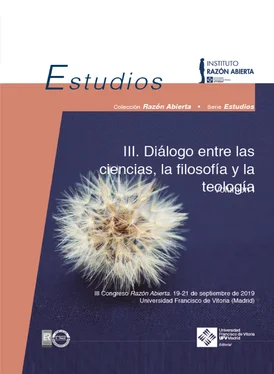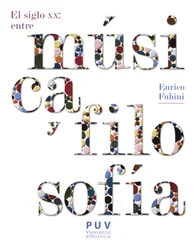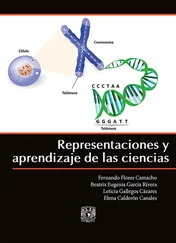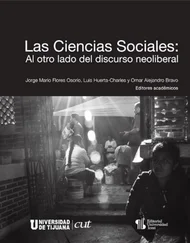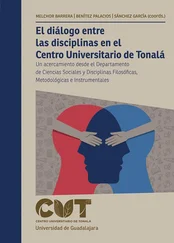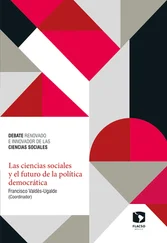María Lacalle - III Diálogo entre las ciencias, la filosofía y la teología. Volumen I
Здесь есть возможность читать онлайн «María Lacalle - III Diálogo entre las ciencias, la filosofía y la teología. Volumen I» — ознакомительный отрывок электронной книги совершенно бесплатно, а после прочтения отрывка купить полную версию. В некоторых случаях можно слушать аудио, скачать через торрент в формате fb2 и присутствует краткое содержание. Жанр: unrecognised, на испанском языке. Описание произведения, (предисловие) а так же отзывы посетителей доступны на портале библиотеки ЛибКат.
- Название:III Diálogo entre las ciencias, la filosofía y la teología. Volumen I
- Автор:
- Жанр:
- Год:неизвестен
- ISBN:нет данных
- Рейтинг книги:5 / 5. Голосов: 1
-
Избранное:Добавить в избранное
- Отзывы:
-
Ваша оценка:
- 100
- 1
- 2
- 3
- 4
- 5
III Diálogo entre las ciencias, la filosofía y la teología. Volumen I: краткое содержание, описание и аннотация
Предлагаем к чтению аннотацию, описание, краткое содержание или предисловие (зависит от того, что написал сам автор книги «III Diálogo entre las ciencias, la filosofía y la teología. Volumen I»). Если вы не нашли необходимую информацию о книге — напишите в комментариях, мы постараемся отыскать её.
III Diálogo entre las ciencias, la filosofía y la teología. Volumen I — читать онлайн ознакомительный отрывок
Ниже представлен текст книги, разбитый по страницам. Система сохранения места последней прочитанной страницы, позволяет с удобством читать онлайн бесплатно книгу «III Diálogo entre las ciencias, la filosofía y la teología. Volumen I», без необходимости каждый раз заново искать на чём Вы остановились. Поставьте закладку, и сможете в любой момент перейти на страницу, на которой закончили чтение.
Интервал:
Закладка:
This is not strictly speaking a refutation of naturalism; some true believers might be willing to grasp this nettle despite its implications. Nietzsche, for example, seems to have understood that metaphysical naturalism entails ethical nihilism. But it seems apparent that we cannot really imagine any form of shared and sustainable, let alone desirable or appealing, human existence that would be compatible with many persons acting on such a view. Indeed, the longstanding project of trying to upgrade morality, as it were, by seeking to ground ethics in scientific findings, reflects both a recognition of the centrality of morality in human life and the hope that perhaps the empirical, rigorous methods of the natural sciences could overcome once and for all, with the same authority enjoyed by chemistry and physics, the ethical disagreements characteristic of human life and the divergences among moral philosophers apparent across cultures and throughout human history. This is what in recent years a number of different scientists and philosophers such as Patricia Churchland, Owen Flanagan, Joshua Greene, Jonathan Haidt, Alex Rosenberg, and others have been trying to do, combining in various ways a Humean sentimentalism, a Darwinian account of the evolution of the mind as an epiphenomenon of the brain, and the utilitarian ethical tradition that goes back to Jeremy Bentham and John Stuart Mill, rooting their efforts in an insistent, empirical naturalism. After an extensive review of these efforts, especially since the rapid rise of neuroimaging technology in the 1980s and 90s, and after considering relevant research in evolutionary biology, evolutionary psychology, primatology, neuroscience, and social psychology, the sociologist James Davison Hunter and philosopher Paul Nedelisky have concluded that even considered collectively, all of these efforts have provided «no clear empirical support for any moral theory, let alone for any claim about what is right and wrong, good or evil, or how we should live.» 13
A second problem with metaphysical naturalism is different in kind – less disturbing in its practical implications for human coexistence, but more serious in strictly intellectual terms. It is not simply the inability of materialist naturalism to explain the phenomenon of consciousness in general, including more specifically human intentionality, cognition, and perhaps above all rationality, but also what multiple philosophers and even some scientists now regard as the impossibility of this explanatory aspiration in principle. Any and every attempt at a psychophysical reduction of first-person experiential awareness to nothing but neurophysiological and ultimately strictly physical processes has not only failed, but looks as though it is bound to fail. In 2011, the distinguished research physician and clinical neuroscientist, Raymond Tallis, a self-described atheist, argued at length in his book Aping Mankind that all attempts to reduce consciousness to nothing but brain functions have failed and cannot but fail. 14 In 2012, one of the most distinguished analytical philosophers in the world, Thomas Nagel of NYU, unsettled the complacency of metaphysically naturalist colleagues committed to reductionist materialism with his short book, Mind and Cosmos , the subtitle of which is Why the Materialist Neo-Darwinian Conception of Nature is Almost Certainly False . Reviewers expressed shock and horror, appalled that Nagel acknowledged the influence on his thinking of Intelligent-Design critics of Darwinism, and risked giving comfort to religious believers even as he was apparently giving up on serious philosophy. Significantly, however, Nagel, like Tallis, is an atheist, and explicitly notes his disdain for theism. 15 He simply does not see how materially reductionist accounts of physical processes alone, whether those currently available or any that might ever become available, could explain objective values (which he thinks are real), the experience of first-person subjective awareness (which is self-evidently and undeniably real), or the human capacity to rise above mere conscious sensation and perception to the comparative weighing of evidence and alternatives and the grasping of truth through rationality: «What has to be explained is not just the lacing of organic life with a tincture of qualia but the coming into existence of subjective individual points of view – a type of existence logically distinct from anything describable by the physical sciences alone» (44). Or again, «[j]ust as consciousness cannot be explained as a mere extension or complication of physical evolution, so reason cannot be explained as a mere extension or complication of consciousness» (81). In Nagel’s estimation, this implies that the entire evolutionary process must be rethought in such a way as to include non-material reality, because we know that the evolutionary process taken as a whole has produced the organisms we are: «materialism is incomplete even as a theory of the physical world, since the physical world includes conscious organisms among its most striking occupants» (45). This leads him to question the possibility of abiogenesis as a strictly physical process, presumably involving extremely complex protein folding and the formation of amino acids as steps on the way. How this or anything else might actually have led to self-replicating life is still a complete mystery but remains an important promissory article of faith among reductionists committed to what Nagel somewhat mischievously calls a «materialism and Darwinism of the gaps»: «no viable account, even a purely speculative one, seems to be available of how a system as staggeringly functionally complex and information-rich as a self-reproducing cell, controlled by DNA, RNA, or some predecessor, could have arisen by chemical evolution alone from a dead environment» (127, 123). Nagel’s aversion to theism leads him to favor some sort of still unknown «integrated naturalistic explanation of a new kind,» a «nonmaterialistic natural order» that would incorporate «natural teleology, or teleological bias,» in which «[t]he tendency for life to form may be a basic feature of the natural order, not explained by the nonteleological laws of physics and chemistry,» even though he is well aware that this is «a throwback to the Aristotelian conception of nature, banished from the scene at the birth of modern science» (68-69, 32, 91, 124, 66). But insofar as modern science has depended on the bracketing of mental phenomena from reality – carrying on with mechanistic materialism as if they did not exist, even though without human mental phenomena there obviously could have been no modern science – it might not be surprising if their existence and categorical irreducibility to matter-energy turn out to be among the stubborn obstacles that ultimately undermine naturalism.
As noted, Nagel wants to preserve some version of naturalism because he is averse to theism (or at least theism in certain versions, to judge from Mind and Cosmos ). His doubts about the comprehensive explanatory adequacy of neo-Darwinian evolutionary theory, insistence on the irreducibility of consciousness and rationality to material explanations, and rejection of metaphysical materialism shocked his colleagues – all of them, like everyone in research universities, members of an academic culture in which materialist, reductionist naturalism is a largely unquestioned and uncritically accepted default assumption.
But naturalism has a bigger, even more fundamental problem than the mystery of consciousness, first-person experience, intentionality, and rationality, and that is, quite simply, the fact of existence, period – that there is anything whatsoever, none of which accounts for or can account for its own existence. Significantly, Nagel nowhere raises this issue in Mind and Cosmos , although he draws close when he states that «[t]he world is an astonishing place, and the idea that we have in our possession the basic tools needed to understand it is no more credible now than it was in Aristotle’s day.» Clearly, he is not talking about scientific explanation when he says of the world «[t]hat it has produced you, and me, and the rest of us is the most astonishing thing about it» (7). Especially astonishing to him is the fact that conscious, rational beings have evolved, which leads him to advocate for a teleological, non-materialist naturalism. Yet properly grasped, the radical contingency of everything that exists and that the natural sciences investigate or could investigate is a logical and metaphysical death knell for naturalism at a more fundamental level. It is part of expanded reason’s revenge on the unjustified restriction of reason to the epistemological imperialism of scientism. And this recognition is itself the product of the exercise of reason – a faculty capable of distinguishing between empirical and conceptual questions, and of understanding that nothing whatsoever in nature, nor nature as a whole, can explain its own existence.
Читать дальшеИнтервал:
Закладка:
Похожие книги на «III Diálogo entre las ciencias, la filosofía y la teología. Volumen I»
Представляем Вашему вниманию похожие книги на «III Diálogo entre las ciencias, la filosofía y la teología. Volumen I» списком для выбора. Мы отобрали схожую по названию и смыслу литературу в надежде предоставить читателям больше вариантов отыскать новые, интересные, ещё непрочитанные произведения.
Обсуждение, отзывы о книге «III Diálogo entre las ciencias, la filosofía y la teología. Volumen I» и просто собственные мнения читателей. Оставьте ваши комментарии, напишите, что Вы думаете о произведении, его смысле или главных героях. Укажите что конкретно понравилось, а что нет, и почему Вы так считаете.
